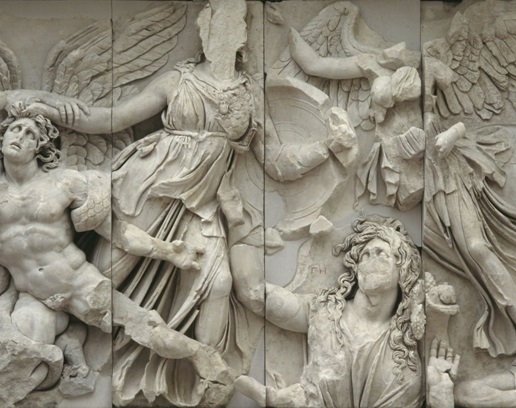
As ECLA of Bard students, we are relatively familiar with one of Berlin’s most amazing treasures—the Pergamon Altar. Not only do we visit it annually in an almost festive fashion as First Years, but it also decorates our homepage. I would even dare to say that if ECLA of Bard were to establish a formal sports team, Pergamon’s Zeus would serve as a mascot.
Yet in the past few years, the Pergamon and other artifacts of Turkish origin are at the center of a cultural battle comparable in scale to that of the Olympian gods and Giants. Recently, the directors of several of the largest and most distinguished museums around the globe such as The Metropolitan, The Louvre or The Pergamon have accused the Turkish government of unprecedented aggressiveness, claiming that the Turks are using any means (including extortion) in order to retrieve their cultural artifacts. Turkey has also been accused of threatening sanctions against countries currently in possession of these treasures (this includes, but is not limited to, forbidding universities and research institutions from conducting excavations on Turkish soil). German officials responded by claiming that all of the Turkish artifacts which are displayed in German museums were purchased legally more than 100 years ago, therefore absolving them of any legal obligation to return them. Irrespective of the legal reality surrounding the artifacts, Turkey’s culture minister, Ertugrul Gunay, claimed in an interview for “The Guardian” earlier this year that these aggressive measures are proving effective, spurring on further reacquisition: “Whatever was returned till today is only the start…We will retrieve many more Turkish national treasures in the next few years”. Political analysts speculate that these efforts are part of the Turkish prime minister’s [1] plans to transform Turkey into a Mediterranean super state by the year 2023, which marks the 100th anniversary of the Republic.
However, as of yet, no Turkish official has demanded the return of The Pergamon Altar. The altar was actually saved almost single-handedly by the German archaeologist Carl Humann, who noticed the local inhabitants of Bergama (Pergamon) melting fine marble stones into lime while surveying a private expedition. After countless meetings, Humann persuaded the German government of the Pergamon’s importance and struck a deal between the Ottomans and his native country, which stipulated that Germany was permitted to excavate the site and ship the finds back to Berlin. In this respect, Germany contributed to the preservation of the altar. However, once in the city’s museum, the altar was exposed to the ravages of WWII, during which it narrowly survived. This contextualization promotes the possibly irreconcilable question: Who should own such a marvel? The Turks, where the artifact was discovered? Or the Germans, who purchased it, thereby saving it from destruction? Or maybe even the Greeks, whose civilization gave rise to this aesthetic and historical marvel? Though the future of the altar raises truly complex questions of justice, making it worthy of much thoughtful debate, I fear that the Pergamon will fall victim to pragmatism.
[1] Tayyip Erdogan
